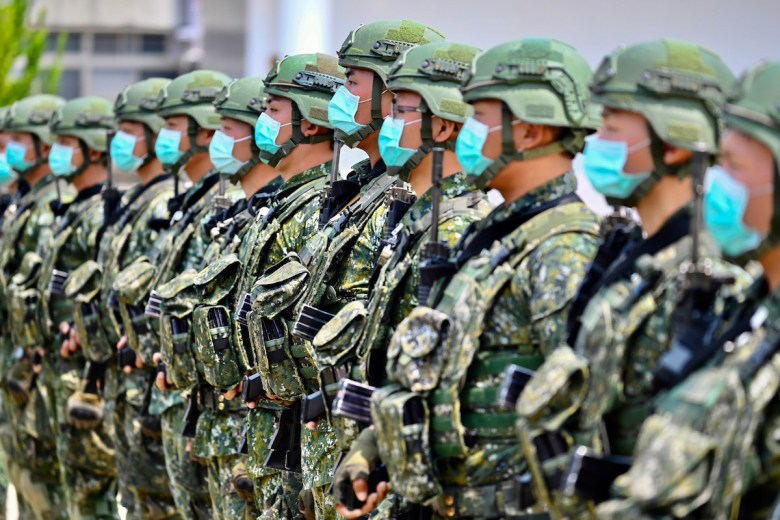A pattern is emerging in Tokyo as yet another top government official talks up the possibility of Japan defending Taiwan in the hypothetical case of a Chinese attack.
One week after Deputy Defense Minister Yashuhide Nakayama made related statements during a presentation to a think tank in the United States, the higher-profile figure of Deputy Prime Minister Taro Aso addressed the same issue on Monday.
“If a major incident happened (over Taiwan), it’s safe to say it would be related to a situation threatening the survival (of Japan),” Japanese media reports quoted political veteran Aso as saying during a political fundraising event in Tokyo late Monday. “If that is the case, Japan and the US must defend Taiwan together.”
Aso added, “We need to think hard that Okinawa could be next.”
While Aso did not explicitly mention China as the threat, the implication was obvious – not least given the proximity of Taiwan to Okinawa’s Ryukyu island chain.
To nobody’s surprise, China shot back on Tuesday, with the Foreign Ministry calling Aso’s comments “wrong and dangerous.”
Aso, a member of an elite Japanese political dynasty who is known for both his outspokenness and long history of gaffes, was in less combative mode on Tuesday.
When the Taiwan issue was raised at a press conference, he said any issues should be resolved “by dialogue,” noting that Japan was “monitoring the situation.”
Chief Cabinet Secretary Katsunobu Kato declined to comment on Aso’s remarks on Monday, calling any Taiwanese contingency a “hypothetical situation.” Defense Minister Nobuo Kishi, for his part, said there had been no change in Tokyo’s alignment with Beijing’s “One China” policy.

A week earlier, Tokyo had downplayed Nakayama’s statements – delivered at the conservative Hudson Institute think tank in Washington DC – by calling them “personal remarks.”
However, Prime Minister Yoshihide Suga had last month described Taiwan as a “country”, in what until now has been widely interpreted as a slip of the tongue. But deliberate comments made by separate officials just a week apart suggest less coincidence and more a groundswell of opinion within the ruling Liberal Democratic Party.
Indeed, Aso’s wording on Monday was precise.
For decades, Japanese politicians were shackled by their constitution from the deployment of force. However, under legal revisions made in 2015, Tokyo can deploy its Self Defense Force on missions other than pure defense of the homeland in situations in which Japan’s own fate hangs in the balance.
Aso’s statements referred to exactly that scenario.
Asia Times has not been able to confirm if Aso and Nakayama had coordinated their statements. While Aso’s were specific, Nakayama’s were more broad, questioning whether the world had been correct in assenting to Beijing’s “One China” policy over Taiwan.
Taiwan is an ultra-sensitive issue for China – most particularly this month, as Beijing celebrates the centennial of the Chinese Communist Party
China’s leadership considers democratic Taiwan a renegade province and expends significant diplomatic capital globally in ensuring that other countries adhere to “One China.”
But cracks may be appearing.
Since 2016, when Donald Trump took power in Washington, a rising strategic confrontation has been taking place between China and the US – a confrontation that has not ameliorated under the Joe Biden administration.

That confrontation is currently coalescing around Taiwan and the US is pressing its leading Pacific ally to toughen its stance. The Taiwan issue was raised when Japanese Prime Minister Suga summited with Biden in April – the highest-profile statement the island had received in Japanese official statements in 69 years, according to some reports.
In recent weeks, China has been making increasingly forceful rhetorical and military moves. It has vowed to crush anyone supporting Taiwanese independence and has been increasing its fighter jet intrusions into Taiwan’s air defense identification zone, or ADIZ.
In terms of Japan’s role, it is difficult to decipher where matters are headed.
Japan, home to extensive US air, naval and marine bases and assets, is the obvious springboard for any American operation to deter China or defend Taiwan. But currently, as Asia Times reported last week, Japan itself is neither politically prepared nor militarily postured to defend Taiwan.
Firstly, the SDF lacks practice and capability in combined air-sea-land operations. Secondly, questions hang over the SDF’s interoperability with US forces when it comes to actual, kinetic operations.
On the political front, smoke and mirrors are in play. Japan’s public is widely assessed as being pacifistic, and even the ruling conservative Liberal Democratic Party is far from united on hawkishness toward China, which is Japan’s leading trade partner.
Is the party’s conservative element agitating for a policy shift?
Aso and Nakayama both perch on the party’s right-wing which, among other things, seeks a stronger-than-ever security relationship with the US. Certainly, the concept of ideas being increasingly voiced in order to open mainstream discussion leading to eventual policy change exists in Japan.
“Ideas get raised and talked about and gradually they materialize into policy and nobody ever remembers quite how it got there,” said Grant Newsham, a retired US Marine colonel with extensive experience in Japan.

Aso comes from a family which, during the Pacific War, deployed slave labor in its mining interests. In the past, he has called for the emperor to visit the controversial Yasukuni Shrine and is reportedly affiliated with the nationwide, supra-political nationalist organization Nippon Kaigi.
Yet while Aso may have more extreme views and be more outspoken than his colleagues, the former prime minister is far from alone in wanting greater Japanese support for Taiwan.
Highly unusually, the island formerly known as Formosa had a positive experience of Japanese colonialism, and interactions between Japanese and Taiwanese are almost uniformly positive.
“There are a lot of politicians in the LDP who are pro-Taiwan,” said Tosh Minohara, who heads Japan’s Research Institute for Indo-Pacific Affairs. “We should not underestimate support for Taiwan.”


